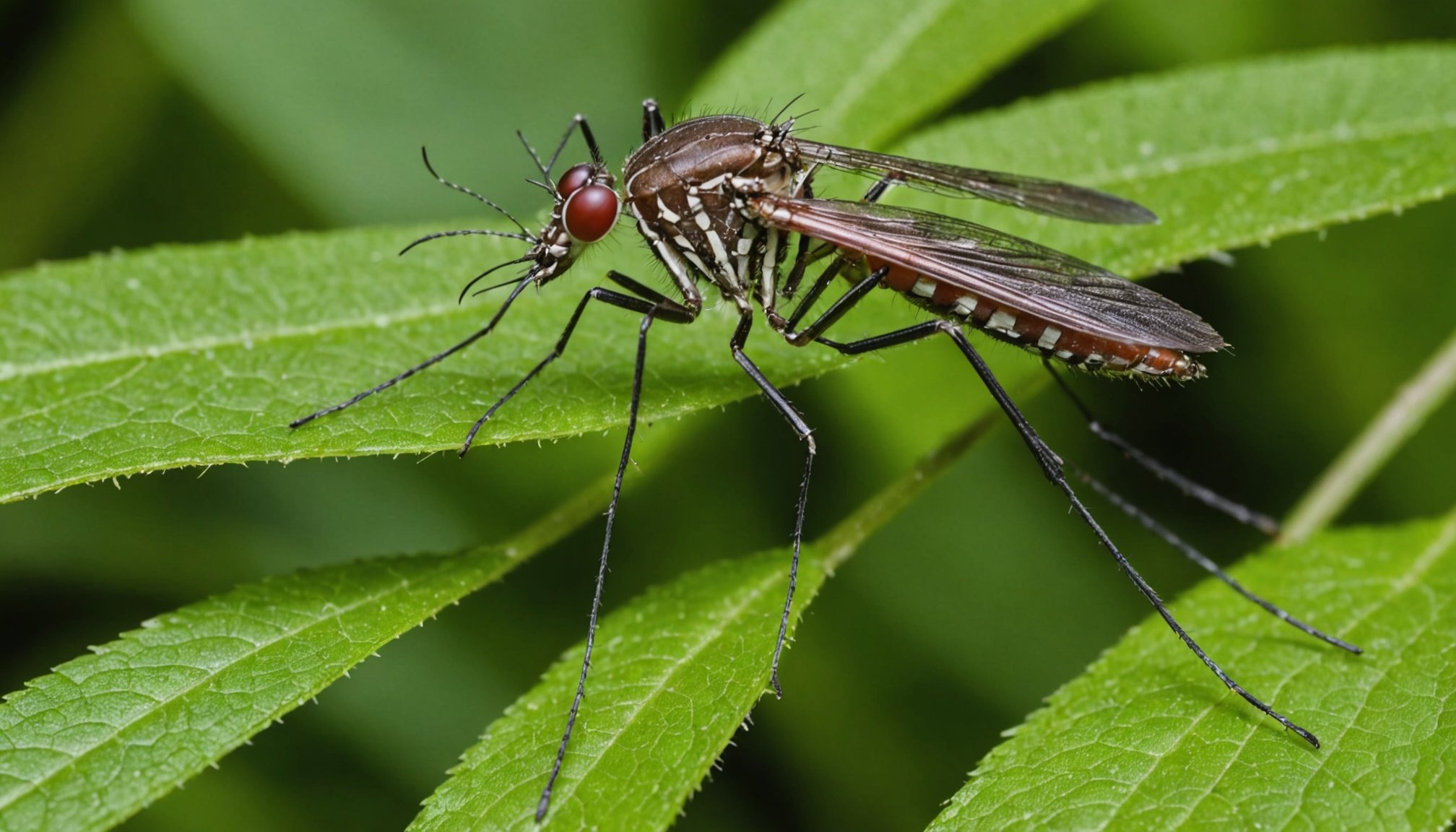Unveiling Green Approaches for Effective Mosquito Control in Your Garden Ecosystem
The Need for Sustainable Mosquito Control
Mosquitoes are more than just a nuisance; they are a significant public health threat, particularly in urban areas. These tiny insects can transmit serious diseases like Zika, malaria, and dengue fever, making effective mosquito control a critical aspect of pest management. However, traditional chemical-based repellents and sprays have several drawbacks. They can disrupt ecosystems, harm beneficial insects such as bees and butterflies, and even linger in the soil or water long after use[1].
Moreover, the overuse of synthetic pesticides has led to the development of mosquito populations that are increasingly resistant to these chemicals. This resistance not only reduces the effectiveness of these pesticides but also poses a long-term threat to public health. Therefore, it is imperative to adopt eco-friendly and sustainable methods for mosquito control.
In the same genre : Easy urban composting: creating an odor-free kitchen waste solution for apartment dwellers
What Makes a Mosquito Control Solution Eco-Friendly?
Eco-friendly mosquito control solutions are distinguished by their ingredients and design. Here are some key characteristics:
Natural Ingredients
Eco-friendly solutions often rely on natural, plant-based ingredients such as essential oils. For example, citronella, lemongrass, and coconut oil are commonly used in these products. These ingredients are as effective as synthetic chemicals but lack the harmful side effects. Moogo’s Green Pro Concentrate, which is made from naturally occurring substances extracted from coconut oil and palm kernel oil, is a prime example of such a product[1].
In parallel : Designing a customized storage solution for your artisanal home bakery: tips for bread lovers
Biodegradable Materials
Eco-friendly solutions focus on materials that biodegrade over time, ensuring they do not pollute the soil or waterways. This approach is crucial for maintaining a healthy environment and preventing long-term ecological damage.
Energy Efficiency
Automated misting systems, like those offered by Moogo, are designed to be energy-efficient. These systems allow for targeted application, reducing waste and unnecessary harm to other areas of your garden ecosystem[1].
Natural Methods for Mosquito Control
There are several natural methods that can be employed to control mosquito populations effectively without harming the environment.
Remove Standing Water
Mosquitoes lay their eggs in stagnant water, so removing standing water is a simple yet effective way to reduce mosquito breeding sites. Regularly check and empty containers like flower pots, bird baths, and gutters. Ensure proper drainage and maintain your lawn to prevent water pooling[3][4].
Use Natural Repellents
Planting mosquito-repellent plants such as citronella, lavender, and marigolds around your home can help keep mosquitoes at bay. These plants not only repel mosquitoes but also add beauty to your garden. Additionally, essential oils like eucalyptus and tea tree oil can be used in DIY repellents or diffusers to create a mosquito-free zone[3][4].
Introduce Predators
Encouraging the presence of natural predators like dragonflies and bats can help control mosquito populations. These animals feed on mosquitoes and can be an effective biological control method[3].
Home-Made Traps
Creating mosquito traps using organic materials like sugar, yeast, and water can attract and trap mosquitoes, reducing their numbers. This method is a creative and eco-friendly way to manage mosquito populations[3].
Effective Eco-Friendly Products for Mosquito Control
Here are some eco-friendly products that are highly effective in controlling mosquitoes:
Essentria IC3
This spray uses all-natural ingredients such as rosemary oil, peppermint oil, and geraniol. It works by blocking a neurotransmitter in arthropods, disrupting their nervous system without harming other organisms. Essentria IC3 is safe for use around water and is beneficial for family and pets[5].
Mosquito Barrier
This product uses garlic as its primary ingredient, which is highly repellent to mosquitoes due to their sharp sense of smell. By mixing 4 ounces of Mosquito Barrier with a gallon of water and spraying it on foliage, you can achieve a significant reduction in mosquito populations[5].
Bti (Bacillus thuringiensis israelensis)
Bti is a naturally occurring bacterium that produces toxins specific to mosquito larvae, black flies, and fungus gnats. It does not affect other types of insects, including honey bees, and is approved for use in organic farming operations. Bti can be applied in granular form to swamps and other breeding habitats to control mosquito breeding effectively[2].
Table: Comparing Eco-Friendly Mosquito Control Methods
| Method | Description | Effectiveness | Environmental Impact |
|---|---|---|---|
| Remove Standing Water | Regularly empty containers and ensure proper drainage. | High | Minimal |
| Natural Repellents | Use plants like citronella, lavender, and essential oils. | Medium to High | Positive |
| Introduce Predators | Encourage dragonflies and bats to feed on mosquitoes. | Medium | Positive |
| Home-Made Traps | Use sugar, yeast, and water to attract and trap mosquitoes. | Low to Medium | Minimal |
| Essentria IC3 | Spray using rosemary oil, peppermint oil, and geraniol. | High | Minimal |
| Mosquito Barrier | Use garlic to repel mosquitoes. | High | Minimal |
| Bti | Apply Bti granules to breeding habitats to kill mosquito larvae. | High | Minimal |
Practical Insights and Actionable Advice
When implementing eco-friendly mosquito control methods, here are some practical tips to keep in mind:
- Regular Maintenance: Regularly inspect your garden for standing water and ensure all containers are emptied.
- Choose the Right Plants: Plant mosquito-repellent plants strategically around outdoor seating areas and entry points to your home.
- Use Essential Oils Wisely: Mix essential oils with a carrier oil and apply them to your skin or use them in a diffuser to keep mosquitoes away.
- Select Eco-Friendly Products: Opt for products like Essentria IC3, Mosquito Barrier, and Bti, which are safe for the environment and effective against mosquitoes.
The Role of Climate Change in Mosquito Control
Climate change is exacerbating the mosquito problem by creating more favorable breeding conditions. Warmer temperatures and increased precipitation can lead to an expansion of mosquito habitats and an increase in mosquito populations. Therefore, adopting sustainable and eco-friendly mosquito control methods is not just a choice but a necessity for long-term pest management.
Effective mosquito control is crucial for maintaining public health, especially in urban areas. By switching to eco-friendly and sustainable methods, you not only protect your family and pets but also contribute to a healthier environment. Remember, every small step, from removing standing water to using natural repellents and eco-friendly products, can make a significant difference in managing mosquito populations.
As Dr. Jane Smith, an entomologist, notes, “The key to effective mosquito control is a multi-faceted approach that includes natural methods, eco-friendly products, and a commitment to sustainability. By working in harmony with nature, we can create a safer and healthier environment for everyone.”
By embracing these green approaches, you can enjoy your garden ecosystem without the constant nuisance of mosquitoes, while also doing your part for the environment. So, the next time you think about mosquito control, consider going green – it’s a decision that benefits both you and the planet.









